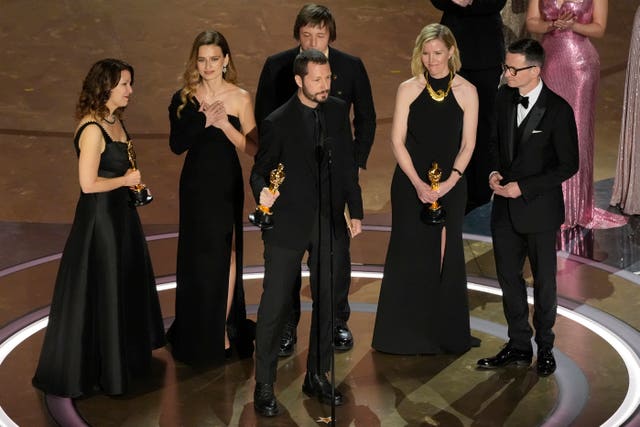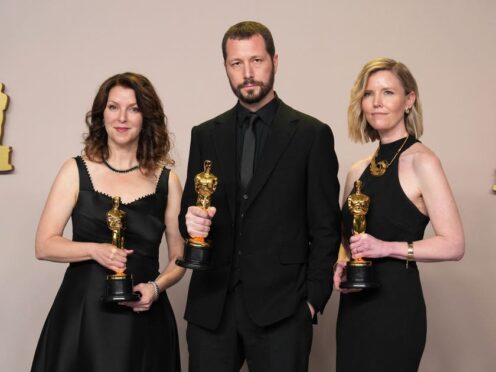President Volodymyr Zelensky has hailed Ukraine’s first Oscar as “important for our entire country”.
Ukraine awoke on Monday to another day of war — Russian drones blasted buildings in the Kharkiv and Odesa regions — but also the news it had won its first Oscar.
The best documentary victory for Mstyslav Chernov’s 20 Days In Mariupol, a harrowing first-person account by the Associated Press journalist of the early days of Russia’s invasion in 2022, was bittersweet.
“This is the first Oscar in Ukrainian history, and I’m honoured,” an emotional Mr Chernov said on Sunday at the Academy Awards.
“Probably I will be the first director on this stage to say I wish I’d never made this film, I wish to be able to exchange this to Russia never attacking Ukraine.”
Back home in his native Ukraine, the award was applauded for exposing the brutal devastation of the war and the message Mr Chernov had sent to the world from one of the biggest stages.
Mr Zelensky said he was grateful to the team and thanked journalists across the world still covering the war despite a decrease in attention as it has dragged into its third year and as much of the world’s focus has turned to Israel’s war against Hamas.
“The horrors of Mariupol must never be forgotten,” he said on social media. “The entire world must see and remember what the inhumane Russian invasion brought to our people. Cities and villages were destroyed, homes were burned, and entire families were killed by Russian shells and buried in their own backyards.”
The AP team of Mr Chernov, photographer Evgeniy Maloletka and producer Vasilisa Stepanenko arrived an hour before Russia began bombing the port city.
Two weeks later, they were the last journalists working for an international outlet in the city, sending crucial dispatches to the outside world showing civilian casualties of all ages, the digging of mass graves, the bombing of a maternity hospital and the sheer extent of the devastation.
The Oscar — and nomination — was a first for both Mr Chernov, an AP video journalist, and the 178-year-old news organisation. The documentary was a joint production of AP and PBS’ Frontline. It was the first win for Frontline after two previous nominations.
Statuettes were awarded to Mr Chernov, producer and editor Michelle Mizner and producer Raney Aronson-Rath. AP vice president Derl McCrudden is also a credited producer on the film and was among those onstage to accept the award.

Police officer Volodymyr Nikulin, who is featured prominently in the film as he helped the crew cover the story and ultimately escape Mariupol as Russian forces closed in, said he was happy the film had won the prestigious award.
Mr Nikulin, who was later injured helping victims of a Russian attack on Pokrovsk in the Donetsk region, ferried the crew around Mariupol in a desperate attempt to help them find a place where they could transmit their footage because he said it was vital the world could see what was happening.
He said the film served as an important reminder of “the most difficult time for our country”.
“Right now, we may be facing a similarly challenging moment,” he told AP in Kyiv on Monday.
“But this film has shown that we can defend our country, that we are united. And at this time, if the world sees that we are fighting, the crimes the aggressor is committing in our country, how it destroys our cities, I believe that the world will support our efforts in the fight, and this will be decisive at this time.”
Ukraine’s human rights chief, Dmytro Lubinets, praised the documentary for showing “the truth to the whole world”.

“This awards ceremony is an opportunity to address millions of people. This is what the film director did by mentioning the occupation, prisoners of war, killing of Ukrainians by Russia, and illegal abduction of civilians,” he wrote on Telegram.
The award, one of many the documentary has garnered including the Pulitzer Prize, comes as Ukraine’s forces and ammunition are depleted and Russian troops are trying to push deeper into the Ukraine-held western part of the Donetsk region and penetrate the Kharkiv region to the north.
Drone attacks overnight damaged two multistorey buildings, a hotel and a municipal building in the eastern city of Kharkiv, said regional governor Oleh Syniehubov. No casualties were reported.
An infrastructure facility in the Odesa region was destroyed and windows were shattered, regional governor Oleh Kiper said.
The award marks the second consecutive Oscar documentary awarded for a film that has shone a harsh light on Russia.
Last year, Navalny, about Russian opposition leader Alexei Navalny who died just last month in prison, won best documentary.
